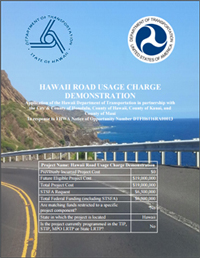
Taxes and tracking your odometer
by Rachelle Chang, Better Hawaii, September 20, 2016
The Hawaii State Highway Fund is funded by fuel taxes, vehicle registration fees, vehicle weight tax, and rental motor vehicle and tour vehicle surcharge taxes. Drivers pay 17¢ to the State of Hawaii, plus up to 17¢ to county governments per gallon of gasoline. The fuel tax currently funds 33% of the State Highway Fund.
Recently, the Hawaii Department of Transportation (DOT) revealed that it is considering a mileage-based user fee for highway maintenance, which would potentially replace the fuel tax. The DOT is planning a statewide pilot “road usage charge” (RUC) test in early 2017.
On the surface, this seems like a good idea. It seems fair. Like fuel taxes, the more you drive, the more taxes you pay. It taxes all vehicles equally, though it does not reward or encourage fuel-efficient vehicles.
But first, there are 5 critical questions that need to be answered:
- Do we need it? In fiscal year 2015, the State Highway Fund collected $86.8 million in fuel taxes, $76 million in vehicle weight taxes, $49 million in vehicle registration fees, and $51.9 million in rental/tour vehicle surcharge taxes, according to the Fiscal Year 2017 State Receipt and Revenue Plans (page 21). The DOT’s budget was $316 million to build and maintain highways, according to the Fiscal Year 2017 Executive Supplemental Budget (page 116). How much additional revenue does the Department of Transportation project to raise from mileage-based user fees?
- Can we afford it? The three-year pilot project is estimated to cost $19 million, which will be paid by Hawaii taxpayers (at least $12.5 million) and federal funds (approx. $6.5 million). Will the additional revenue collected from usage fees cover the cost to administer the program and increase revenues for the State Highway Fund?
- How will mileage-based use taxes affect tax collection? The DOT currently requires annual safety checks, in which odometer readings are collected. Would the mileage-based usage fee be collected at the time of the safety check? Will the DOT need to step-up enforcement of safety checks? How will an annual fee affect tax collection, compared with fuel taxes, which are collected at the time fuel is purchased? What kind of burden would this place on taxpayers, who would pay a lump-sum tax once a year? How would tax collection be affected if the proposal to create bi-annual safety checks (due to improved car manufacturing and safety standards) gains support in the legislature?
- How will odometer readings be used? Odometer readers are already collected during annual safety inspections, but will the DOT share this data with other agencies – such as insurance companies or employers? How will the DOT protect drivers’ privacy?
- Will the usage fee truly replace fuel taxes? This is the most significant concern. There is no guarantee that a mileage-based fee will replace the fuel tax, or add another level of fees. A new administration, new Congress-members, new department heads, and economic downturns are all opportunities to “extend” fees and taxes indefinitely.
I usually support user-based fees, because it places more of the burden for maintenance on those who make the most use of a service or facility. But when it comes to government, I am concerned that replacement taxes, like “temporary” taxes, never go away.
To review the grant proposal, visit http://hidot.hawaii.gov/administration/library/publications/.
How many miles to you drive in an average year? Do you support a mileage-based user fee? Would it make you change your driving habits?
|